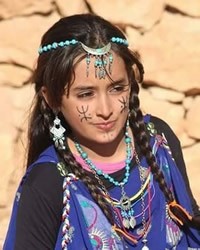Berber, Shawiya in Italy

Photo Source:
Lofy40 - Wikimedia
Creative Commons
|
Send Joshua Project a map of this people group.
|
| People Name: | Berber, Shawiya |
| Country: | Italy |
| 10/40 Window: | No |
| Population: | 39,000 |
| World Population: | 2,796,000 |
| Primary Language: | Tachawit |
| Primary Religion: | Islam |
| Christian Adherents: | 0.00 % |
| Evangelicals: | 0.00 % |
| Scripture: | Portions |
| Ministry Resources: | No |
| Jesus Film: | Yes |
| Audio Recordings: | Yes |
| People Cluster: | Berber-Shawiya |
| Affinity Bloc: | Arab World |
| Progress Level: |
|
Introduction / History
The Shawiya are Berber shepherds originating from the Aures Plateau of the Atlas Mountains in northern Algeria and Tunisia. The Africans call this entire region of North Africa Maghrib. The inaccessible peaks of the Atlas Mountains long served as a refuge for the Berbers. These rugged mountains provided a base of resistance against the Romans, Vandals, Byzantines, and Arabs. However, Muslims conquered the Maghrib between 670 and 700 A. D. The Shawiya are a part of various Berber groups that have risen in Algeria to defend their identity. In general, they are sturdy, thrifty, hospitable, and lovers of the soil. They are also proud, shrewd, persistent, and loyal. In particular, a passion for independence is deeply ingrained in their culture. The Berbers refer to themselves as Imazighen, or "free and noble men." This term has become an indicator of their identity and nationalism. In late 1993, after armed Muslims attacked several Berber villages, Berber nationalists proclaimed that they have suffered repression for many years and that the Algerian government refuses to recognize Berber identity. In addition, there have been sporadic assault by Muslim militias against Berber communities. These armed attacks have been in the Berber regions of the Kabyle and Shawiya (the town of Batna, in particular). This situation has caused Shawiya people to flee to lands where there is peace and better economic opportunities like Italy.
Where Are they Located?
Most live in North Africa, especially Algeria, but a few have moved to European countries like Italy.
What Are Their Lives Like?
Living now in a Western culture for the sake of employment opportunities, the Shawiyas straddle two cultures. In Italy they have the opportunity to be in contact with Christian believers who can freely share the gospel with them. However, there is a rule of thumb that the sooner Christ followers reach them the more likely they are to find safe haven in the Savior's arms. This window of opportunity may no longer exist among the Shawiyas in Europe. Yet, God is a miracle working God and He can get to Shawiya hearts in Europe where there is freedom of religion. Many probably consider Italy a resting point on their way to countries further north with stronger economies.
What Are Their Beliefs?
Although they accepted Islam as their own religion centuries ago, the Berbers also maintained their pre-Islamic cultural and ritual traditions even to this day. The acceptance of Islam and the adoption of Arabic ways never completely erased Berber culture. Although they are nominally Sunni Muslims, most Shawiya have little knowledge of the practices of the Koran and other dimensions of Middle Eastern Islam. They usually identify with Islam, but they have a hole in their hearts that only Jesus Christ can fill.
What Are Their Needs?
The Shawiya community needs economic opportunities that will come from modern education and training. This will enhance their ability to earn a good living in a modern country like Italy.
Prayer Points
Pray that God will save key leaders among the Shawiya who will boldly allow their people to examine and embrace the teachings of Jesus Christ. Ask God to raise up prayer teams who, through worship and intercession, will begin to break up the soil of the Shawiya hearts to receive the seed of the gospel. Pray for a church planting movement among Shawiya communities in Europe.